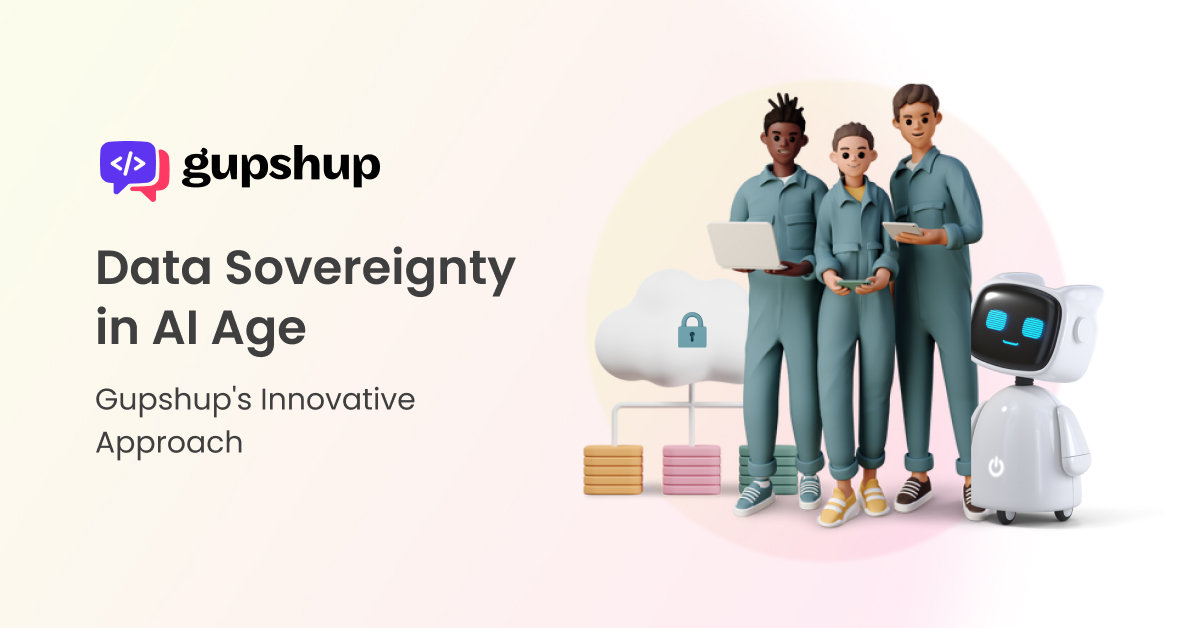Data Sovereignty in the AI Age: Gupshup’s Innovative Approach

Introduction
In the rapidly evolving landscape of artificial intelligence (AI), businesses are harnessing cutting edge technology to transform their operations and enhance customer experiences. However, as AI technologies continue to advance, concerns regarding data sovereignty have come to the forefront. Data sovereignty refers to the legal and regulatory control that countries have over the data generated within their borders. In an era where data is a critical asset, businesses must navigate the complexities of data privacy, security, residency, and sovereignty. This blog delves into the subject of data sovereignty and explores how we at Gupshup address these challenges.
Understanding Data Sovereignty
Data sovereignty revolves around four interconnected concepts: data privacy, data security, data residency, and data sovereignty itself. These elements encompass the protection, privacy, and control of data throughout its lifecycle.

How Are Countries Approaching Data Sovereignty?
In an interconnected world, the proliferation of AI technology has spurred nations to define their positions and strategies on how to regulate and govern this transformative field. As the AI landscape expands, a divergence in approaches has emerged among major global powers—the United States, the European Union (EU), and China—each framing their AI governance based on their respective values, societal priorities, and geopolitical considerations. These distinct approaches have the potential to shape the future of AI development, technology interoperability, and the broader geopolitical landscape.
European Union: Pioneering a Comprehensive Regulatory Framework
The European Union has taken a proactive stance in shaping AI governance by enacting comprehensive regulations to safeguard citizens’ rights and foster innovation. The EU’s General Data Protection Regulation (GDPR) served as a precedent for data regulation worldwide. The impending EU AI Act, set to take effect by 2024, establishes a risk-based regulatory framework that spans various levels of AI applications, from high-risk systems to low-risk models. The EU’s approach prioritizes data protection, transparency, and accountability, ensuring that AI development aligns with human rights and societal values.
United States: Balancing Innovation with Minimal Regulation
In contrast, the United States has adopted a more hands-off approach to AI governance, emphasizing innovation and industrial development. The U.S. has prioritized fostering a conducive environment for tech companies to thrive without burdensome regulation. While certain states, like California, have introduced data privacy legislation, there is no comprehensive national data protection policy like the GDPR. The U.S. government’s focus on allowing companies to drive AI innovation has led to initiatives like the Algorithmic Accountability Act, aimed at enhancing transparency and accountability without imposing comprehensive regulatory frameworks.
China: Centralized Governance and Technological Ambitions
China’s AI governance strategy is characterized by centralized government guidance, aimed at promoting technological development while maintaining social stability. China has implemented the Personal Information Protection Law (PIPL) to regulate data and enacted rules governing recommender engines. These regulations prioritize the government’s influence over content and behavior, shaping AI development to align with the Communist Party’s core values.
India: Digital Personal Data Protection (DPDP) Bill
In the context of India’s rapidly evolving data protection landscape, the Digital Personal Data Protection (DPDP) Bill, 2023 plays a pivotal role in shaping the interaction between AI technologies and data privacy. The Bill introduces a nuanced perspective on AI services like OpenAI’s ChatGPT and Google Bard by allowing them to scrape publicly available personal data from the internet without explicit user consent or adherence to certain provisions of the Bill. The law may not cover personal data that individuals themselves have made publicly available, such as on social media, as they willingly shared it, allowing its processing without invoking data protection rules.
Brazil: General Data Protection Law (LGPD)
The LGPD, or Brazilian General Data Protection Law, is a comprehensive data protection regulation in Brazil that safeguards individuals’ personal data and regulates its processing. To enhance it further, the Senate’s announcement of the Brazilian Bill of Artificial Intelligence in May 2023 underscores the nation’s proactive steps towards comprehensive AI regulation. Focused on transparency and accountability, the bill seeks to strike a balance between AI innovation and ethical deployment. A pivotal aspect of the bill involves the mandatory self-assessment by AI system suppliers to classify them as high or excessive risk, encompassing domains such as credit rating, legal decisions, medical diagnoses, autonomous vehicles, and more.

Data Safety and Cybersecurity Risks
One of the key concerns associated with the use of generative AI is data safety. This encompasses both personal and strategic data, which can be compromised during the training and application of AI models. With generative AI’s potential misuse such as deep fakes, misinformation and possible copyright issues, securing the supply chain of AI models becomes crucial to prevent data leaks and breaches.
Preservation of Cultural Wealth
Generative AI, driven by language models, can inadvertently erode cultural and linguistic diversity if not handled thoughtfully. A significant portion of these models is developed and trained in English, potentially sidelining cultural nuances and languages. To maintain digital sovereignty, countries need to create national or regional foundational models that respect linguistic and cultural specificities.
Navigating Future Regulations
While there aren’t comprehensive AI-specific data sovereignty regulations globally, jurisdictions like the European Union have taken initial steps to address AI ethics and data handling. Technological decoupling, driven by divergent regulatory priorities, may lead to the emergence of distinct digital ecosystems and challenges in international cooperation. As AI continues to advance and reshape society, finding common ground on AI governance will be crucial to ensure that technological innovation aligns with ethical, human-centric values and fosters global collaboration in addressing the opportunities and risks posed by AI. The challenge of harmonizing AI governance is not only about policy alignment but also about shaping the trajectory of a technology that transcends borders and touches every facet of our lives.
Gupshup’s Approach to Data Sovereignty
Gupshup, a trailblazer in AI-driven conversational solutions, offers a simple approach to address data sovereignty challenges. As conversations and interactions with customers become more AI-driven, concerns around data handling and protection amplify.
Gupshup’s innovative solution utilizes fine-tuned language models that cater to specific enterprise needs while ensuring data remains under the organization’s control. This approach effectively tackles data sovereignty concerns while providing tailored conversational AI capabilities.
Introducing Fine-Tuned Models
Gupshup’s strategy centers on leveraging open-source language models and customizing them to align with specific use cases. For instance, the company has taken the open-source LLM model, Llama 2, and enhanced it by fine-tuning it for vertical and function-specific enterprise customer engagement use cases.
Industry-Specific Tailoring
Recognizing that various industries have unique conversational requirements, Gupshup has further developed vertical-specific models. These models are meticulously fine-tuned to cater to industries like banking, insurance, retail, and utilities. This meticulous customization ensures that the AI effectively understands and responds to industry-specific language and context.
Function-Specific Models
Customer engagement use cases that span across industries and specific to a function have special requirements. Our function-specific models are fine-tuned to perform better in functional areas like HR&IT and Support.
Hosting
To address data sovereignty concerns, Gupshup empowers organizations by offering an installable application. This application can be deployed on private clouds, keeping the data entirely within the organization’s network. This approach circumvents the need for relying on public cloud services for AI capabilities, ensuring data stays within the organization’s jurisdiction.
Conclusion
In the realm of AI-driven conversations and data-intensive operations, addressing data sovereignty is crucial for businesses. Gupshup’s innovative approach of utilizing fine-tuned models, tailoring solutions to specific industries, and providing hosting options empowers organizations to navigate the complex landscape of data protection, security, and compliance. As AI and data sovereignty continue to evolve, we are providing enterprises with the tools they need to thrive in this new era of conversational AI.

Blogs you will want to share. Delivered to your inbox.
Business Email
Recommended Resources
Read: From Large Data to Great Wisdom: How Industry LLMs Elevate Insights, Conversations, and Customer Experience



